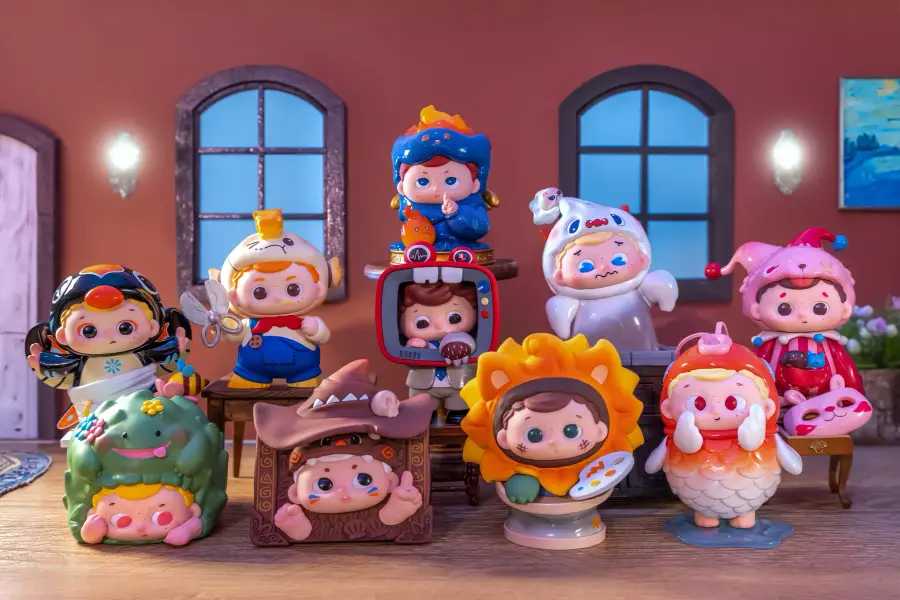QuantaSing excites investors with new toy tune

The adult education company’s shares have tripled since it disclosed a plan to enter the collectible toy business through a major acquisition that closed on March 31
Key Takeaways:
- QuantaSing closed its purchase of collectible toy developer Letsvan at the end of March, and expects the purchase to make a “significant” revenue contribution in its June quarter
- Revenue from the company’s core adult education services plunged by 40% in its latest quarter, as it focused on customer quality over quantity
By Doug Young
QuantaSing Group Ltd. (QSG.US) is learning there are many ways to get cautious consumers to part with their hard-earned money in a sluggish economy.
First, it did that by selling education products to adults, playing on the deeply engrained value Chinese place on self-improvement for themselves and their children. Now it’s discovered something people like even more in such economically uncertain times. That something is toys for adults, part of what’s locally called the “goods economy” that refers to products that help people play in the present to avoid thinking too much about the future.
Discussion of QuantaSing’s recent movement into collectible toys was the highlight of its latest quarterly results announced last Friday. The company’s announced that it completed its purchase of 61% of Shenzhen Yiqi Culture Co. Ltd. on March 31 for 235 mln yuan ($33 million) in cash. Yiqi’s main asset is Letsvan, which makes collectible toys for adults that have become all the rage in China lately.
QuantaSing’s legacy adult education business was less impressive in the quarter through March, the company’s third fiscal quarter. Revenue for its core businesses of providing financial literacy and skills upgrading courses tumbled by nearly half, as it focused on the most profitable customers over simply chasing big numbers.
Even in its core education business, the company is finding some early success by developing more leisure-oriented products like combining education with hobbies like calligraphy and travel. The popularity of such products seems to reflect a growing desire by Chinese to enjoy the present through hobbies like calligraphy, buying collectible toys and dressing up as their favorite anime characters. A more traditional preference for self-improvement education seems to be taking a back seat in the current economic slowdown, probably the result of a weak job market.
“Pop toys have become powerful vehicles for self-expression, particularly among millennials and Gen Z. The sector has proven resilient with key players sustaining strong growth even in economic downturns,” said Chairman Li Peng on the company’s earnings call. “Today’s consumer is (increasingly interested in) emotional value over pure functionality. They are seeking comfort, identity affirmation and connection through their purchases. And the pop toys deliver exactly that.”
Investors have gobbled up QuantaSing’s transformation story. The company’s shares have tripled over the last three months, including a nearly 20% jump on Friday after the latest earnings announcement. The stock currently trades at a forward price-to-earnings (P/E) ratio of 23, which looks strong compared with the 13 for education services leader New Oriental (EDU.US; 9901.HK). But QuantaSing probably hopes to eventually achieve a multiple closer to the 47 for Pop Mart (9992.HK), whose shares have skyrocketed over the last year on the huge success for its collectible toys, including the wildly popular Labubu series.
QuantaSing spent much of its earnings release and conference call discussing the Letsvan acquisition, whose results will be included in its next financial quarter for the three months through June. Despite queries from analysts on Letsvan’s future revenue contribution, CFO Xie Dong would only say that the “pop toy business will account for a very significant level of overall revenue at the consolidated level in the next quarter.”
Aggressive expansion
QuantaSing said it has big plans for Letsvan, both domestically and internationally. Letsvan traditionally licensed its characters, with names like Wakuku, to third parties like retailer Miniso (MNSO.US; 9896.HK), which sells the toys in its separate Top Toy chain of stores that it’s preparing to spin off for a separate IPO.
QuantaSing plans to continue such third-party licensing, but also intends to develop its own chain of stores, similar to Pop Mart and Top Toy. The company revealed that it took its first step in that direction by opening a pop-up store at a popular Beijing shopping mall on May 24.
Letsvan has also taken some initial steps outside China, and will accelerate that campaign under QuantaSing’s ownership. “International expansion initiatives are underway,” the company said in its earnings announcement. “Letsvan has already established its footprints in certain Southeast Asian markets and has been exploring opportunities in other overseas markets, including the United States.”
The company has certainly built up huge expectations for its move into collectible toys, which could make its stock vulnerable if its first results including Letsvan aren’t as impressive as many investors are hoping.
One thing QuantaSing has in its favor is its ability to run an extremely profitable education business, even if that business is shrinking. Its gross margin was 83.1% in the quarter through March, which was down slightly from 84.6%, but well ahead of Pop Mart’s 63.9% gross margin last year. We can probably expect QuantaSing’s margin to come down after it includes the new toy business, and investors will be watching closely to see by how much.
We’ll close with a quick look at the company’s core education services, which are rapidly contracting but still quite profitable. QuantaSing’s revenue fell 40% year-on-year to 571 million yuan in the three months to March from 946 million yuan a year earlier. It blamed the plunge on a 44% decline in revenue from its individual online learning services, which account for more than 80% of its total.
But the company also did a good job controlling costs, with the result that both its net income and adjusted net income rose year-on-year to 41.1 million yuan and 37.8 million yuan, respectively. The company had 1.13 billion yuan in cash and short-term investments at the end of March, up from 1.03 billion yuan at the end of June last year, showing it has plenty of financial resources to facilitate its integration and expansion of Letsvan’s toy business.
CFO Xie hinted at some heavy spending ahead during that process, which could eat into QuantaSing’s profits and profitability over the near-term.
“With our healthy cash position, we have the flexibility to support both our existing operations and our strategic initiatives in the pop toys space,” Xie said on the earnings call. “Though we anticipate some near-term profitability fluctuations as we optimize our business mix, our financial foundation remains robust as we execute this strategic evolution.”
To subscribe to Bamboo Works weekly free newsletter, click here





